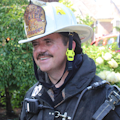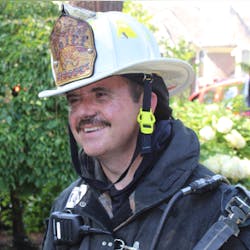First Due: Operating in Today’s Media Environment
Today’s fire service, as is the case for all public safety agencies, operates in the public eye. News cameras and self-appointed social media journalists are everywhere, including at fire scenes. This applies equally to career and volunteer departments.
We have trained to fight fires, make rescues and command emergency operations. We have built muscle memory in the skills that are needed to protect lives and property. However, have we trained on the skills that are needed to explain what we do to a reporter or to issue a media release on public protective measures during a major emergency or natural disaster?
When the news media appears at a fire scene or the station, most officers and chiefs might want to transmit a “mayday” and seek emergency assistance in dealing with the press. Here are basic tips to help you and your department to interact with the media.
Use them to help you
Don’t bury your head in the sand and hope that the media will just go away. A wise PIO once said, “The media is a like a hungry dog. You can feed it from your hand and control what it eats, or you can let it go around back and dig through your trash cans until it finds something to eat.”
You must accept the fact that the media exists to tell stories that the public wants to see. It’s in your best interest to cooperate with the media and to help them tell stories with your input and influence.
The media also can tell stories that you want/need to be told. They are an excellent partner in spreading the word on fire prevention, recruitment—both career and volunteer—and the work of your department. Use them to help tell your stories.
Understand their job
You must understand the news media’s job. By learning the role of a reporter or photographer, you can establish partnerships that benefit those who are on both sides of the camera.
The media must tell interesting stories through video, photographs and/or words. Those stories must be compelling, to draw in as many people as possible.
Tight deadlines mandate getting the news out as quickly as possible, which might make reporters seem pesky at times at fire scenes.
News is a business, and you must work with the media without compromising your ability to do your job.
As you learn about their job, you also must show them yours/the department’s. Invite media to visit stations and to attend trainings. Educate them on firefighting and EMS. Host a “Media Academy,” so local media can don gear and perform evolutions, to experience first-hand the work of their local fire department. These investments in educating the media and building relationships will pay significant dividends the next time that they cover your department.
Be accessible
Always return reporters’ phone calls. Meet with them when they come to your stations for stories. Work with them to share information at emergency scenes. Don’t be the chief who hides behind “no comment” every time that you are called on to interact with the media. You might not be able to answer all of their questions all of the time (see below), but always be accessible to the media.
Always be honest
Honesty is the best and only policy in dealing with the media. Although I preach media cooperation throughout this column, you know that there will be times when you can’t answer every reporter’s question or when you might have to withhold sensitive information. However, being selective in what information that you share or which questions that you answer isn’t the same as lying or being dishonest with the media.
You must be honest with the media always. “I can’t answer that question at this time” is an honest response. That said, do answer as many questions as you can and always do so truthfully. Lie to a reporter once, and once you get caught—and in today’s connected society, you likely will get caught—your credibility will be out the window, which means it won’t be there when you really need it.
Mutually beneficial
Working together with the media—rather than fighting against them—ultimately best serves you, your department and the citizens who you protect.
About the Author

Robert Leonard
Robert Leonard is a 32-year veteran of the fire service and currently is an assistant chief of the Syosset Volunteer Fire Department on Long Island, NY. He has spent the past three decades handling media relations and crisis communications for fire and emergency service agencies, including serving as Deputy Director of Public Information for FDNY. Leonard is an executive vice president at a national public relations firm, where he heads the public and life safety practice.
